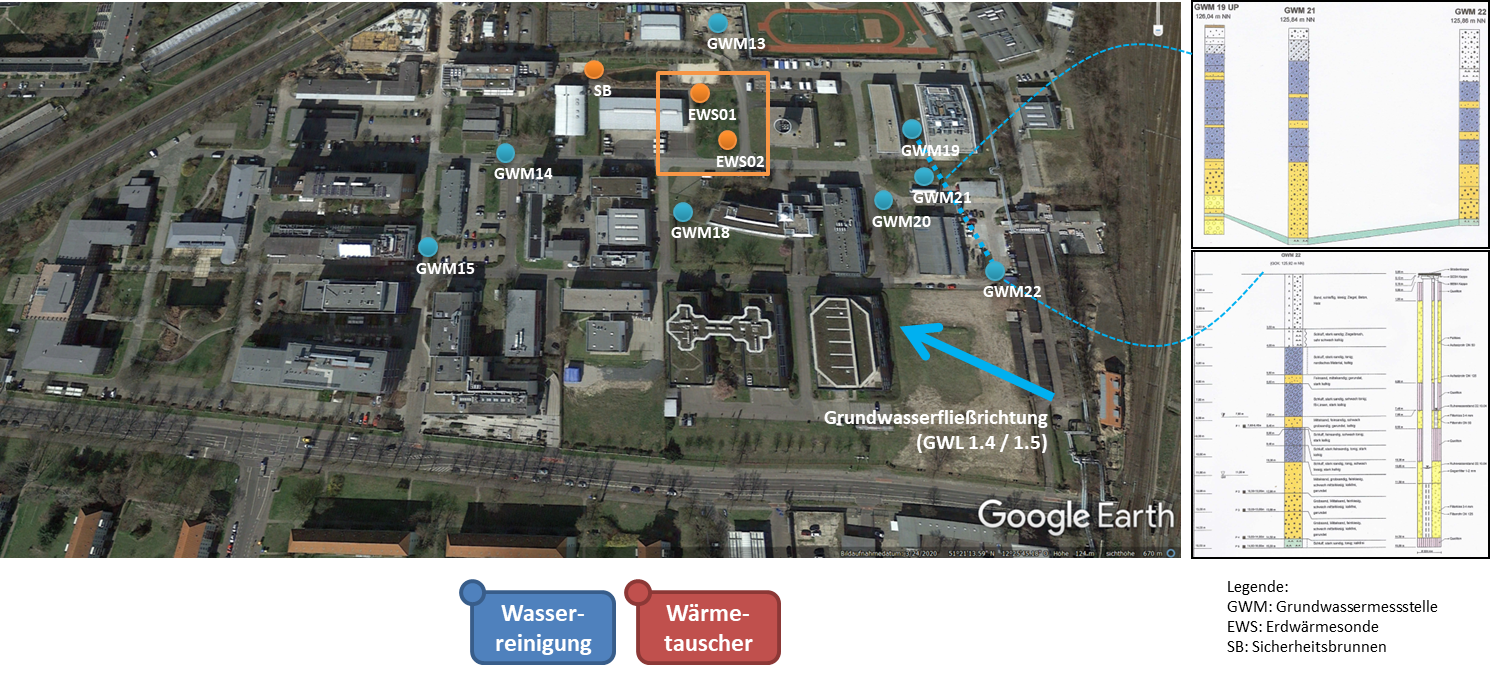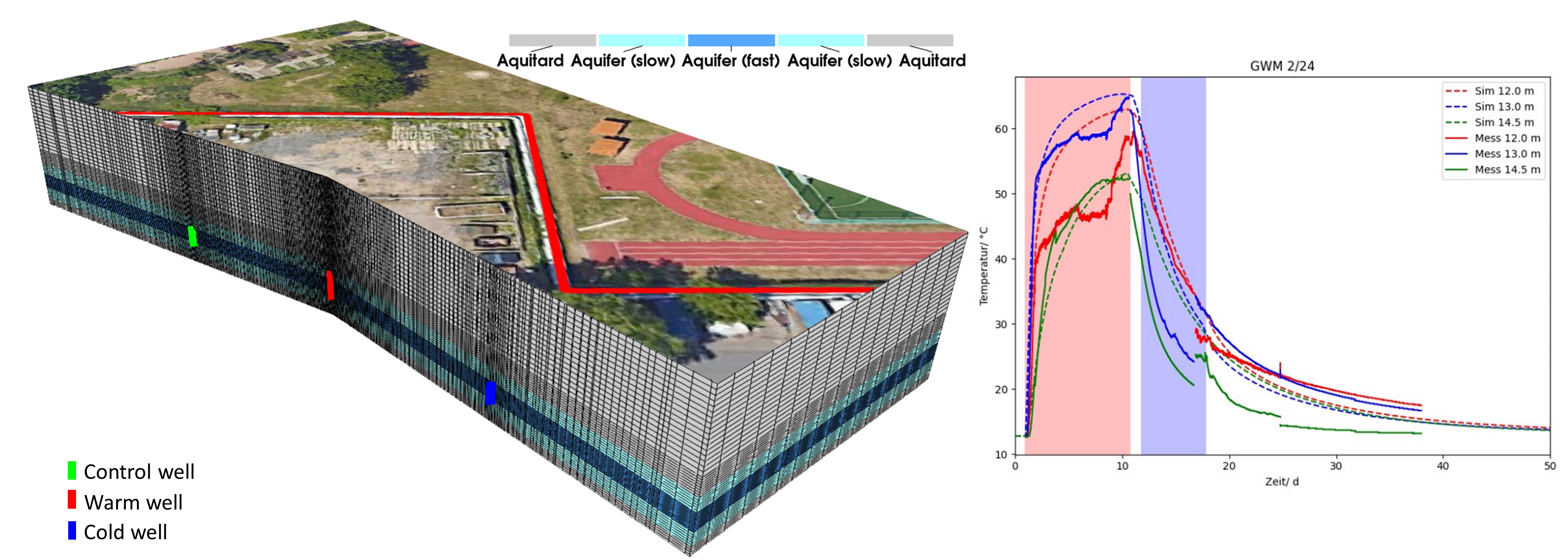KONATES
Project title: KONATES - Design and pilot plant testing for the use of contaminated aquifers for heat management with ATES plants
Project description:
Aquifer Thermal Energy Storage (ATES) represents a highly promising approach for CO₂-neutral seasonal heat management, particularly in urban environments. In many cities, however, shallow aquifers are often contaminated with pollutants originating from former industrial activities, which restricts their suitability for thermal energy storage applications.
To address this challenge, the research project KONATES (KONtaminiertATES) investigates the feasibility of cyclic high-temperature ATES operation (up to 70 °C) in a contaminated aquifer, with the objective of combining seasonal thermal energy storage and in situ and on-site groundwater remediation under representative site-specific conditions. For this purpose, a field-scale HT-ATES pilot facility has been implemented on a 40 × 40 m experimental site located on the campus of the Wissenschaftspark Leipzig (Germany).
The study centers on aquifer GWL 1.5, a gravel-dominated unit of the Early Saalian Main Terrace of the Mulde River, which constitutes one of the principal groundwater bodies in the Leipzig urban area. The aquifer is approximately 5 meters thick, consists predominantly of coarse-grained sands and gravels, and is located at a depth of about 10 to 15 meters below ground surface. Groundwater in the study area exhibits a stable temperature of 13 °C, while local flow velocities range between 1 and 2 meters per day. The aquifer is contaminated with volatile halogenated hydrocarbons (LHKWs), notably Trichloroethene (TCE) and cis-Dichloroethene (cDCE), with maximum concentrations of 6.0 mg/L and 0.4 mg/L, respectively. This contamination is not only characteristic for many urban-industrial groundwater systems but also forms the basis for the experimental concept. It provides the essential boundary conditions for assessing how thermal storage processes influence microbiological, hydrochemical, and geochemical interactions within the contaminated subsurface and the aboveground components of the ATES system.
To monitor the associated thermal and hydraulic dynamics, a multi-level monitoring network was installed at the site. In addition to the two operational wells for cold and warm water injection and extraction, the setup includes a downgradient control well. Furthermore, a dense array of 15 groundwater monitoring wells (2-inch casing) has been installed. These are equipped with screened intervals between 11 and 15 meters below ground surface and fitted with temperature sensor chains, allowing high-resolution vertical profiling of the thermal field in the aquifer. In addition, several sampling ports integrated into the aboveground ATES installation enable targeted observation and control at critical system interfaces.
Based on high-resolution numerical simulations using the OpenGeoSys (OGS) platform, the operational design was developed to optimize thermal recovery efficiency and ensure compliance with site-specific regulatory constraints (e.g., a maximum permitted temperature increase of +4 °C at the downgradient boundary). The storage operation follows a cyclic thermal loading regime, comprising a 10-day heat injection phase (“warm season”), a 1-day thermal stabilization phase, and a 10-day extraction phase (“cold season”). Groundwater is abstracted from a cold well at a controlled flow rate of 600 L/h, subjected to multi-stage treatment (gravel, activated carbon, and zeolite-based filtration), and subsequently heated to 70 °C via an electrically powered heat pump. This artificial thermal input enables reproducible operating conditions, essential for controlled scientific analysis. The use of synthetic heat sources distinguishes the pilot installation from real-world ATES systems, which typically rely on waste heat or building-integrated sources. Heated water is reinjected via a warm well and allowed to migrate under natural gradient conditions. Following the injection phase, ambient-temperature groundwater is pumped out of the cold well (upgradient) and reinfiltrated into a downgradient control well (1,000 L/h) to stabilize the thermal plume prior to extraction.
The scientific investigation encompasses hydrochemical, microbiological, isotopic, and geophysical methods to evaluate the impact of temperature dynamics on redox conditions, contaminant degradation pathways, microbial community structure, and potential side effects such as biofouling, iron precipitation, gas formation, and biocorrosion. Special emphasis is placed on the identification of thermophilic or temperature-sensitive microbial taxa involved in the degradation of chlorinated solvents, as well as on the performance and regeneration behaviour of sorptive filter materials.
Preliminary experimental results confirm the technical viability of cyclic HT-ATES operation under field conditions in a contaminated aquifer. The system was operated reliably over three complete storage cycles. Ongoing analyses will inform process optimization, risk mitigation, and long-term system stability. The findings will be consolidated into a technical guidance document aimed at practitioners and decision-makers, outlining best practices for the integration of thermal energy storage and remediation technologies in contaminated urban subsurfaces.




